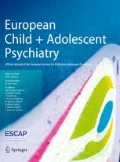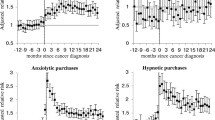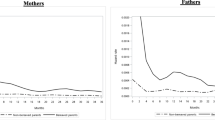Abstract
The psychological consequences of losing a parent to cancer are unclear. We investigated whether experiencing parental death to cancer before 18 years of age increases the risk of psychotropic medication. We used register data of all children born in Denmark between 1 January 1987 and 31 December 2016 (N = 1,488,846). We assessed rate ratios (RRs) with 95% confidence intervals (CIs) for first redeemed prescription of antidepressants, anxiolytics and hypnotics according to parental death status using Poisson multi-state models. We further examined whether the associations differed according to the gender of the deceased parent, child’s age at the time of death or the parental length of illness. Cancer-bereaved children had a significantly increased risk of first prescription of psychotropic medication (rate ratio, RR 1.22, 95% confidence interval, CI 1.10–1.34 for males; RR 1.18, 95% CI 1.09–1.28 for females). Associations were strongest if the parent had the same sex as the child and if the parent died within one year of diagnosis. The risk was highest during the first six months after the loss (RR 2.35, 95% confidence interval, CI 1.48–3.73 for males; RR 1.81, 95% CI 1.17–2.80 for females). Children who lose a parent to cancer, particularly in cases when the disease progressed quickly, may need extra psychological support, especially during the first six months after the death.


Similar content being viewed by others
Data availability
This study is based on nationwide registry data available through Statistics Denmark’s Division of Research Services (https://www.dst.dk/en/TilSalg/Forskningsservice). Access to registry data is only possible when the approval and permission from the relevant data regulation agencies have been obtained.
References
Ferlay J, Colombet M, Soerjomataram I, Mathers C, Parkin DM, Piñeros M et al (2019) Estimating the global cancer incidence and mortality in 2018: GLOBOCAN sources and methods. Int J Cancer 144(8):1941–1953. https://doi.org/10.1002/ijc.31937
Syse A, Aas GB, Loge JH (2012) Children and young adults with parents with cancer: a population-based study. Clin Epidemiol 4:41–52. https://doi.org/10.2147/CLEP.S28984
Weaver KE, Rowland JH, Alfano CM, McNeel TS (2010) Parental cancer and the family: a population-based estimate of the number of US cancer survivors residing with their minor children. Cancer 116(18):4395–4401. https://doi.org/10.1002/cncr.25368
Hamdan S, Mazariegos D, Melhem NM, Porta G, Payne MW, Brent DA (2012) Effect of parental bereavement on health risk behaviors in youth: a 3-year follow-up. Arch Pediatr Adolesc Med 166(3):216–223. https://doi.org/10.1001/archpediatrics.2011.682
Melhem NM, Walker M, Moritz G, Brent DA (2008) Antecedents and sequelae of sudden parental death in offspring and surviving caregivers. Arch Pediatr Adolesc Med 162(5):403–410. https://doi.org/10.1001/archpedi.162.5.403
Høeg BL, Appel CW, von Heymann-Horan AB, Frederiksen K, Johansen C, Boge P et al (2017) Maladaptive coping in adults who have experienced early parental loss and grief counseling. J Health Psychol 22(14):1851–1861. https://doi.org/10.1177/1359105316638550
Appel CW, Johansen C, Christensen J, Frederiksen K, Hjalgrim H, Dalton SO et al (2016) Risk of use of antidepressants among children and young adults exposed to the death of a parent. Epidemiology 27(4):578–585. https://doi.org/10.1097/ede.0000000000000481
Appel CW, Johansen C, Deltour I, Frederiksen K, Hjalgrim H, Dalton SO et al (2013) Early parental death and risk of hospitalization for affective disorder in adulthood. Epidemiology 24(4):608–615. https://doi.org/10.1097/EDE.0b013e3182915df8
Høeg BL, Johansen C, Christensen J, Frederiksen K, Dalton SO, Bøge P et al (2018) Does losing a parent early influence the education you obtain? A nationwide cohort study in Denmark. J Public Health 41(2):296–304. https://doi.org/10.1093/pubmed/fdy070
Hoffmann R, Kaiser J, Kersting A (2018) Psychosocial outcomes in cancer-bereaved children and adolescents: a systematic review. Psychooncology 27(10):2327–2338. https://doi.org/10.1002/pon.4863
Siegel K, Karus D, Raveis VH (1996) Adjustment of children facing the death of a parent due to cancer. J Am Acad Child Adolesc Psychiatry 35(4):442–450. https://doi.org/10.1097/00004583-199604000-00010
Howell KH, Barrett-Becker EP, Burnside AN, Wamser-Nanney R, Layne CM, Kaplow JB (2016) Children facing parental cancer versus parental death: the buffering effects of positive parenting and emotional expression. J Child Fam Stud 25(1):152–164. https://doi.org/10.1007/s10826-015-0198-3
Chen R, Regodón Wallin A, Norén Selinus E, Sjölander A, Fall K, Valdimarsdóttir U et al (2018) Psychiatric disorders among children of parents with cancer: a Swedish register-based matched cohort study. Psychooncology 27(7):1854–1860. https://doi.org/10.1002/pon.4738
Thastum M, Watson M, Kienbacher C, Piha J, Steck B, Zachariae R et al (2009) Prevalence and predictors of emotional and behavioural functioning of children where a parent has cancer: a multinational study. Cancer 115(17):4030–4039. https://doi.org/10.1002/cncr.24449
Pfeffer CR, Karus D, Siegel K, Jiang H (2000) Child survivors of parental death from cancer or suicide: depressive and behavioral outcomes. Psychooncology 9(1):1–10
Raveis V, Siegel K, Karus D (1999) Children’s psychological distress following the death of a parent. J Youth Adolesc 28(2):165–180. https://doi.org/10.1023/A:1021697230387
Bylund Grenklo T, Kreicbergs U, Hauksdóttir A et al (2013) Self-injury in teenagers who lost a parent to cancer: a nationwide, population-based, long-term follow-up. JAMA Pediatr 167(2):133–140. https://doi.org/10.1001/jamapediatrics.2013.430
Pedersen CB (2011) The Danish Civil Registration System. Scand J Public Health 39(7 Suppl):22–25. https://doi.org/10.1177/1403494810387965
Gjerstorff ML (2011) The Danish Cancer Registry. Scand J Public Health 39(7 Suppl):42–45. https://doi.org/10.1177/1403494810393562
Juel K, Helweg-Larsen K (1999) The Danish registers of causes of death. Dan Med Bull 46(4):354–357
Bailley SE, Kral MJ, Dunham K (1999) Survivors of suicide do grieve differently: empirical support for a common sense proposition. Suicide Life Threat Behav 29(3):256–271
Appel CW, Frederiksen K, Hjalgrim H, Dyregrov A, Dalton SO, Dencker A et al (2018) Depressive symptoms and mental health-related quality of life in adolescence and young adulthood after early parental death. Scand J Public Health. https://doi.org/10.1177/1403494818806371
Li J, Vestergaard M, Cnattingius S, Gissler M, Bech BH, Obel C et al (2014) Mortality after parental death in childhood: a nationwide cohort study from three Nordic countries. PLoS Med 11(7):e1001679. https://doi.org/10.1371/journal.pmed.1001679
Kildemoes HW, Sorensen HT, Hallas J (2011) The Danish National Prescription Registry. Scand J Public Health 39(7 Suppl):38–41. https://doi.org/10.1177/1403494810394717
WHO. International language for drug utilization research. WHO Collaborating Centre for Drug Statistics Methodology 2019. https://www.whocc.no/.
Berg L, Rostila M, Hjern A (2016) Parental death during childhood and depression in young adults - a national cohort study. J Child Psychol Psychiatry 57(9):1092–1098. https://doi.org/10.1111/jcpp.12560
Jensen VM, Rasmussen AW (2011) Danish Education Registers. Scand J Public Health 39(7 Suppl):91–94. https://doi.org/10.1177/1403494810394715
Baadsgaard M, Quitzau J (2011) Danish registers on personal income and transfer payments. Scand J Public Health 39(7 Suppl):103–105. https://doi.org/10.1177/1403494811405098
Dafni U (2011) Landmark analysis at the 25-year landmark point. Circ Cardiovasc Qual Outcomes 4(3):363–371. https://doi.org/10.1161/CIRCOUTCOMES.110.957951
Aalen OO, Johansen S (1978) An empirical transition matrix for non-homogeneous Markov chains based on censored observations. Scand J Stat 5(3):141–150
Rosthoj S, Andersen PK, Abildstrom SZ (2004) SAS macros for estimation of the cumulative incidence functions based on a Cox regression model for competing risks survival data. Comput Methods Programs Biomed 74(1):69–75. https://doi.org/10.1016/s0169-2607(03)00069-5
Høeg BL, Johansen C, Christensen J, Frederiksen K, Dalton SO, Dyregrov A et al (2018) Early parental loss and intimate relationships in adulthood: A nationwide study. Dev Psychol 54(5):963–974. https://doi.org/10.1037/dev0000483
SAS Institute Inc (2013) SAS® 9.4 statements: reference. SAS Institute Inc, Cary
Bylund Grenklo T, Kreicbergs U, Hauksdottir A, Valdimarsdottir UA, Nyberg T, Steineck G et al (2013) Self-injury in teenagers who lost a parent to cancer: a nationwide, population-based, long-term follow-up. JAMA Pediatr 167(2):133–140. https://doi.org/10.1001/jamapediatrics.2013.430
Mireault GC, Compas BE (1996) A prospective study of coping and adjustment before and after a parent’s death from cancer. J Psychosoc Oncol 14(4):1–18. https://doi.org/10.1300/J077v14n04_01
Shah BK, Armaly J, Swieter E (2017) Impact of parental cancer on children. Anticancer Res 37(8):4025–4028
Schmitt F, Piha J, Helenius H, Baldus C, Kienbacher C, Steck B et al (2008) Multinational study of cancer patients and their children: factors associated with family functioning. J Clin Oncol 26(36):5877–5883. https://doi.org/10.1200/jco.2007.12.8132
Jordan JR (2001) Is suicide bereavement different? A reassessment of the literature. Suicide Life Threat Behav 31(1):91–102
Hanna JR, McCaughan E, Beck ER, Semple CJ (2021) Providing care to parents dying from cancer with dependent children: health and social care professionals’ experience. Psychooncology 30(3):331–339. https://doi.org/10.1002/pon.5581
Semple CJ, McCaughan E, Beck ER, Hanna JR (2021) ‘Living in parallel worlds’—bereaved parents’ experience of family life when a parent with dependent children is at end of life from cancer: a qualitative study. Palliat Med 35(5):933–942. https://doi.org/10.1177/02692163211001719
Eilis M, Cherith JS, Jeffrey RH (2021) ‘Don’t forget the children’: a qualitative study when a parent is at end of life from cancer. Support Care Cancer. https://doi.org/10.21203/rs.3.rs-346298/v1
Eplov LF, Jørgensen T, Hougaard E, Kessing L, Larsen L, Stage K et al (2005) Behandling af depressionssygdomme [Treatment of depression]. The Danish Health Authority, Copenhagen
Kaplow JB, Layne CM, Pynoos RS, Cohen JA, Lieberman A (2012) DSM-V diagnostic criteria for bereavement-related disorders in children and adolescents: developmental considerations. Psychiatry 75(3):243–266. https://doi.org/10.1521/psyc.2012.75.3.243
Nielsen MK, Carlsen AH, Neergaard MA, Bidstrup PE, Guldin M-B (2019) Looking beyond the mean in grief trajectories: a prospective, population-based cohort study. Soc Sci Med 232:460–469. https://doi.org/10.1016/j.socscimed.2018.10.007
Bonanno GA, Boerner K, Wortman CB (2008) Trajectories of grieving. In: Handbook of bereavement research and practice: advances in theory and intervention. American Psychological Association, Washington, DC, pp 287–307
Killikelly C, Maercker A (2018) Prolonged grief disorder for ICD-11: the primacy of clinical utility and international applicability. Eur J Psychotraumatol 8(Suppl 6):1476441. https://doi.org/10.1080/20008198.2018.1476441
Prigerson HG, Maciejewski PK (2017) Rebuilding consensus on valid criteria for disordered grief. JAMA Psychiat 74(5):435–436. https://doi.org/10.1001/jamapsychiatry.2017.0293
Melhem NM, Porta G, Walker Payne M, Brent DA (2013) Identifying prolonged grief reactions in children: dimensional and diagnostic approaches. J Am Acad Child Adolesc Psychiatry 52(6):599-607.e7. https://doi.org/10.1016/j.jaac.2013.02.015
Shah SM, Carey IM, Harris T, DeWilde S, Victor CR, Cook DG (2013) Initiation of psychotropic medication after partner bereavement: a matched cohort study. PLoS ONE 8(11):e77734-e. https://doi.org/10.1371/journal.pone.0077734
Fenger-Grøn M, Kjaersgaard MIS, Parner ET, Guldin M-B, Vedsted P, Vestergaard M (2018) Early treatment with talk therapy or antidepressants in severely bereaved people and risk of suicidal behavior and psychiatric illness: an instrumental variable analysis. Clin Epidemiol 10:1013–1026. https://doi.org/10.2147/CLEP.S157996
Shear MK, Reynolds CF 3rd, Simon NM, Zisook S, Wang Y, Mauro C et al (2016) Optimizing treatment of complicated grief: a randomized clinical trial. JAMA Psychiat 73(7):685–694. https://doi.org/10.1001/jamapsychiatry.2016.0892
Currier JM, Holland JM, Neimeyer RA (2007) The effectiveness of bereavement interventions with children: a meta-analytic review of controlled outcome research. J Clin Child Adolesc Psychol 36(2):253–259. https://doi.org/10.1080/15374410701279669
Rosner R, Kruse J, Hagl M (2010) A meta-analysis of interventions for bereaved children and adolescents. Death Stud 34(2):99–136. https://doi.org/10.1080/07481180903492422
Acknowledgements
We thank Anja Krøyer for her invaluable help in the data management of this study.
Funding
This work was supported by the Danish Cancer Society—Psychosocial Fund (Grant number R119-A7589-15-S35).
Author information
Authors and Affiliations
Contributions
BLH contributed to the design of the study, acquisition of data, analysis and interpretation of data and drafted the initial manuscript. JC managed the data and carried out the data analyses. LB contributed to the conception and design of the study, the analysis and interpretation of the data. KF contributed to the design of the study and supervised the data analyses. CWA, AD, MBG, SJ, ML and PB contributed to the analysis and interpretation of the data. SOD contributed to the supervision of the study, analysis and interpretation of the data. PED contributed to the conception and design of the study, acquisition of data, supervision of the study, the analysis and interpretation of the data. All authors reviewed and revised the manuscript, and approved the final manuscript as submitted.
Corresponding author
Ethics declarations
Conflict of interest
On behalf of all authors, the corresponding author states that there is no conflict of interest.
Ethics approval and consent to participate
Since only anonymized registry data was used, no ethical approval or informed consent is required under Danish law. This study is registered at the Danish Cancer Society Research Center’s internal records (2019-DCRC-0124) under the European Union’s General Data Protection Regulation.
Consent for publication
Not applicable.
Rights and permissions
About this article
Cite this article
Høeg, B.L., Christensen, J., Banko, L. et al. Psychotropic medication among children who experience parental death to cancer. Eur Child Adolesc Psychiatry 32, 155–165 (2023). https://doi.org/10.1007/s00787-021-01846-y
Received:
Accepted:
Published:
Issue Date:
DOI: https://doi.org/10.1007/s00787-021-01846-y




